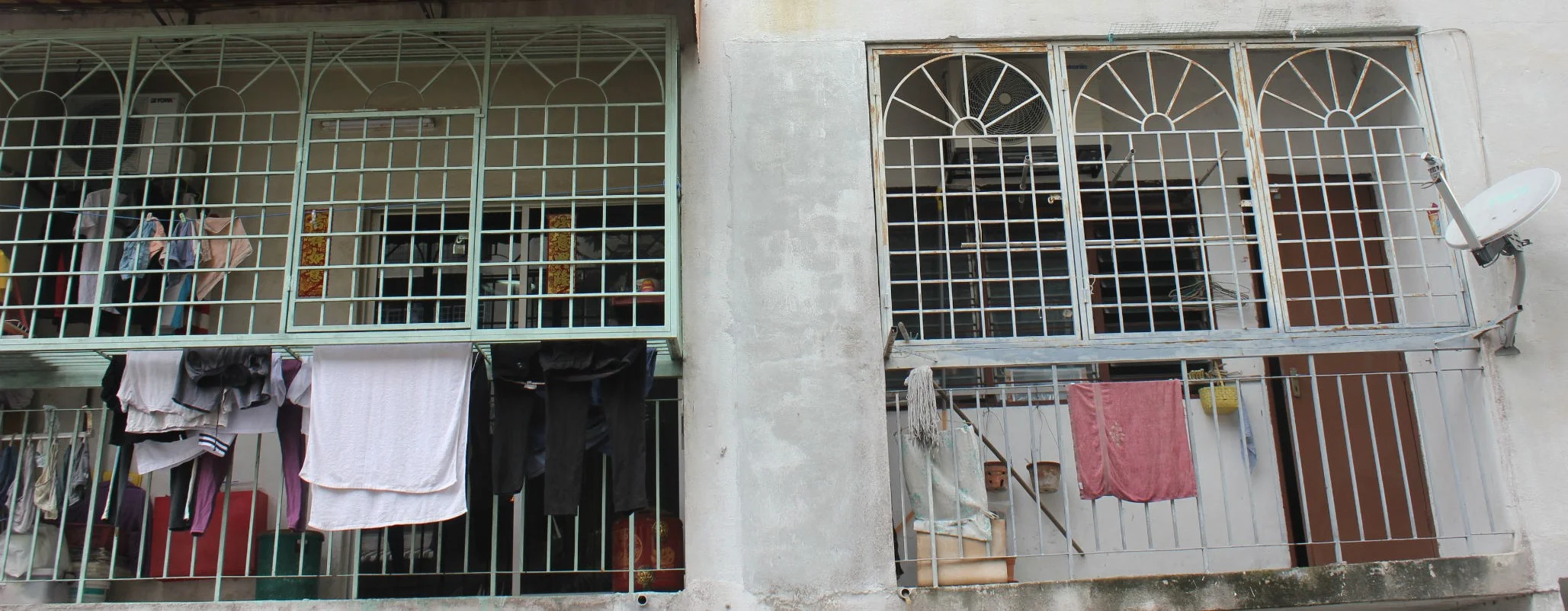‘Jasmina, what do you miss the most from Myanmar?’ I asked her when she sat in the far corner of the room. ‘My parents…’. was her heartbreaking answer and she started crying, clinging to her 7-year-old daughter....
We had accepted an invitation to break the Ramadan fast with a Rohingya refugee family in a northern suburb of Kuala Lumpur. Francien and I did not really know what to expect. Before the sunset, we entered a run-down apartment block, 5-storeys high, bare concrete, burglar bars on the balconies hung with washing, an empty birdcage hanging, cats running around, small puddles of water on the barely lit concrete stair case. Jasmina welcomed us into their home. Following custom in Malaysia, we left our shoes outside. We sat on two carpets in one of the three rooms. Apart from a small table there was no furniture other than two old TV’s in the corner. There were water stains on the ceiling, texts from the Koran hung on the walls and electrical wires strung from wall to wall.
Jasmina fled from the Rohingya refugee camp of Sittwe in Myanmar 24 years ago, to escape war and religious prosecution. She belongs to the Rohingya’s, a Muslim people from the Rakhine State in northern Myanmar. They were denied their own land in Myanmar or Bangladesh when these countries gained independence from Britain. She was 16 years old and just married when she reached Thailand by boat. From there she and her husband Abang walked down to Malaysia where they lived one year in the jungle. Finally exhausted and frightened they made it to Kuala Lumpur. They now have 8 children: three married, one resettled in USA, two in boarding school in Kuala Lumpur where they attend an (illegal) school for refugees. To earn a little money, Jasmina does odd cleaning jobs and cooks for The Picha Project. She was shy and only spoke Malay, which our organizers Swee-Lin and Kim kindly translated for us. During our visit, Abang stayed in another room, shamed he cannot provide for his family having a sense of worthlessness.
Then we heard the muezzin from the next door mosque call for prayer. It was time for Berbuka Puasa, when Muslims during the Ramadan break their fast starting with fresh dates. On the carpet Jasmina and one of her daughters put dishes with rice, chicken-curry, salads and spicy vegetables with water and juice. The sound of the muezzin had something mystical, here a world away from our own rich bubble! I was touched by the strength these people, with so little future hopes, received from their religion. We all shared the food in community.
“There are 65 million forcibly displaced people around the world”
Malaysia never signed the UNHCR convention, but acknowledged it. Therefore, these and many other refugees (there are 145000 UNCHR registered refugees in Malaysia, mainly from Myanmar, some from Palestine, Sri Lanka, Pakistan, Afghanistan, Syria, Iraq and Somalia) have no legal status here and live in a grey and illegal ‘zone’. They have no medical insurance, no schooling, no work permit, not even a passport. -simply, no control over their lives –
“Kim and Swee Lin from The Picha Project, passionate to make a difference in helping these people. They do an outstanding job.”
These stateless people form an informal sector, men and women Francien and I only meet when buying coconuts from a food-stall, a delivery men knocks on our front-door, our car needs washing or the furniture needs steam cleaning. Private organizations like The Picha Project and NGO’s are active to help them.
Jasmina’s family cannot return to their homeland and therefore the only hope they hold is that they eventually be allowed to settle down in another country. Resettlement into a country which will give them citizenship must be processed via the UNHCR, a tedious process, taking many years. Currently only 1% of all refugees per year are successful. But since the USA has closed its borders, Europe is shutting its doors and Australia is making it increasingly more difficult, resettlement has all but come to a hold.
After a delicious meal we said a heartfelt good-bye to Jasmina and her family. When we left the squalid building, I realized I will never comprehend the agony these people face in the day to day struggle to survive. Jasmina showed Francien and myself how insignificant the problems in our own bubble really are. They deserve our help.












